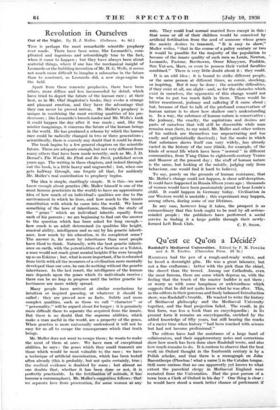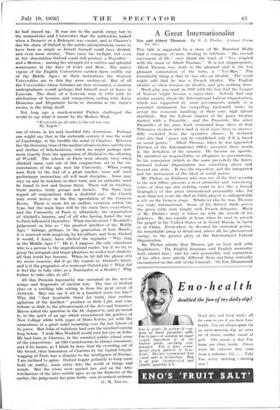Qu'est ce Qu'on a D&icle?
RASHDALL had the pen of a rough-and-ready writer, and he loved a downright gibe. He was a great labourer, but not a free craftsman ; better with the pick than the chisel, the shovel than the trowel. Among our Cathedrals, even, the most famous, there are some which depress us, with the feeling that the touch of the master builder is not there ; or worry us with some lumpiness or awkwaidness which suggests that he did not quite know what he was after. Was,.
as the editors in their generous and finely balanced Introduction show, was Rashdall's trouble. He wanted to write the history of Mediaeval philosophy and the Mediaeval University together, and the final projection failed. The result, in its first form, was less a book than an encyclopaedia ; in its present form it remains an encyclopaedia, enriched by the added knowledge of fifty years, but still bearing the marks of a racier time when history " had been touched with science but had not become professional."
The editors have had the assistance of a large band of collaborators, and their supplementary notes and corrections show how much has been done since Rashdall wrote, and also how much remains to do. It is curious to observe that the best work on Oxford thought in the fourteenth century is by a Polish scholar, and that there is a monograph on John Baconthorpe (Phoebus ! what a name !) in the Catalan tongue. Still more curious that no one apparently yet knows to what extent the parochial clergy in Mediaeval England were recruited from the Universities. Had the poor parson of a town been a Clerk of Oxford in his day ? One thing is clear : he would have stood a much better chance of preferment if
he had stayed up. it. was not to the parish clergy but to the monasteries and Universities that the authorities looked when a Deanery or a Bishopric was vacant, and in Chaucer's day the share of Oxford in the public administration seems 'to have been as ample as Jowett himself could have desired, and even more stormy. Then came the twilight, but even in her obscuration Oxford could still produce a Waynfletf.-- and a Morton ; nursing her strength for a sudden and splendid renaissance in the days of Colet and More. The native vigour of the English Universities carried them swiftly out of the Middle Ages : in their institutions the Scottish Universities are to this day more mediaeval. But of all the Universities whose fortunes are here recounted, a modern undergraduate would perhaps find himself most at home in Louvain. The diary of a Louvain man in 1476 with its alternation of lectures and composition, ending with Jocus Honestus and Disputatio Levis et Jucunda in the tutor's rooms, is the thing itself.
Not long ago a much-revered Prelate challenged the world to say what it meant by the Modern Mind.
"Forthwith on all sides to his aid was run By Angels."
one of whom, in his zeal, tumbled into Averroism. Perhaps one might say that in the sixteenth century it was the mind of Cambridge, in the twelfth the mind of Chartres. Between lies the flowering time of the mediaeval universities, and the rise and decline of Scholasticism, which we might perhaps date more exactly from the appearance of Abelard to the silencing of Wycliff. The schools of Paris were already busy when Abelard came, and out of this conjunction, set in the cir- cumstances of the age, rose the University. When young men flock to the feet of a great teacher, some will need preliminary instruction, all will need discipline. Some may stay on and be teachers in their turn, and an authority must be found to test and license them. There will be rivalries, trade unions, study .groups and hostels. The State may regard all corporations with a doubtful eye ; the Church may scent heresy in the free speculation of the Common Room. There is room for an endless variation within the type, but the main lines will be the main lines everywhere, and the University of Paris is, ultimately, the organisation of Abelard's hearers, and of all who having found the way to Paris followed it thereafter. What was his secret ? Rashdall's judgement on him as " the greatest intellect of the Middle Ages " belongs, perhaps, to the generation of Lux Mundi ; it is received with misgiving by his editors, and from Abelard it would, I fancy, have elicited the rejoinder " Why drag in the Middle Ages ? " He is, I suppose, the only schoolman who is a person to the unprofessional reader, but if we try to grasp the arrogant and tragic phantom we realise how shadowy all that world has become. When he let fall the phrase alia res unius nominis, did it go the rounds as Abelard's latest, and is it the progenitor of a worn-out Oxford joke ? What did it feel like to take sides as a Nominalist or a Realist ? Why bother to take sides at all ?
All this Parisian logomachy was sustained on the mtrzst scraps and fragments of ancient lore. The star of Oxford rises on a swelling tide setting in from the great ocean of Aristotle. May one say it set in a hundred years too late ? Why did " that insatiable thirst for truth, that restless agitation of the intellect " produce so little 1 ght, and con- tribute so little to the advancement of the Ails and Sciences ? Bacon asked the question in the De Augniereis, and answered it, in the spirit of an age which remembered the garders of New College white with pages of Duns Scotus, yet with the earnestness of a great mind mourning over the lost labour of its peers. But John of Salisbury had seen the mischief coming long before. I wish Miss Waddell would turn her eye on John. He had been at Chartres, in the soundest public school sense of the preposition ; an Old Carnotensian he always remained; and if he means, as I think he does, that the crowding out of . the broad, clear humanism of Chartres by the topical tongue- wagging of Paris was a disaster to the intelligence of Europe, I am inclined to agree. Oxford fought gallantly to keep some hold on reality, some entry into the world of things and minds. But the times were against her, and on the Aris- totelianism of the later middle ages, as on the Dialectic of the earlier, the judgement has gone forth—non fecundavit animam.
G. M. YOUNG,











































 Previous page
Previous page